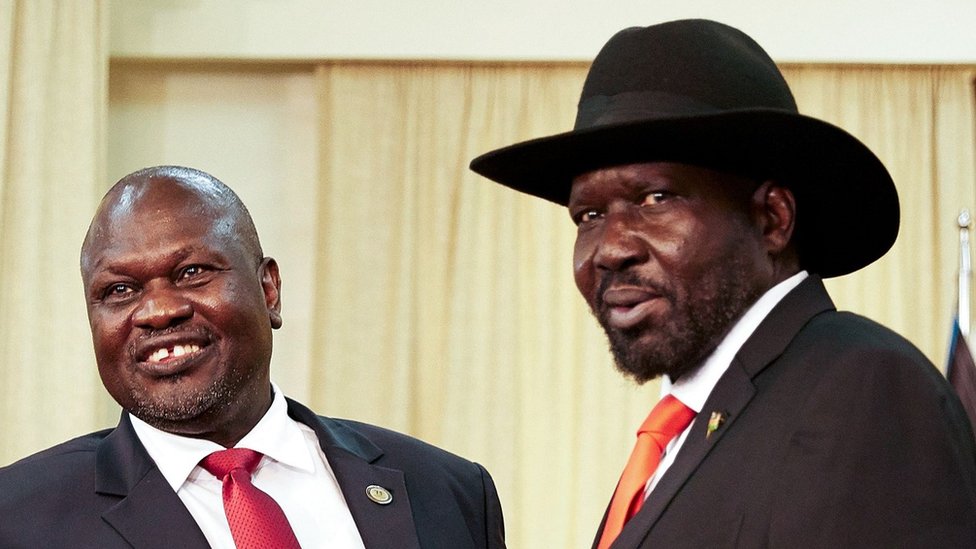The long-standing internal struggle for control of the Sudan People’s Liberation Movement (SPLM) reached a decisive turning point in 2013. During a highly contentious party meeting at Nyakuron Hall in Juba, Salva Kiir Mayardit blocked all avenues for the SPLM to conduct free and fair primary elections after being challenged by three contenders—the most prominent of whom was Dr. Riek Machar. Rather than subjecting himself to democratic competition, Kiir refused to relinquish his position and instead urged Machar to form his own political party. This act marked the final rupture within the SPLM and set the stage for the outbreak of civil war later that year. In response, Machar launched a new political and military movement—the SPLM/A-In Opposition (SPLM/A-IO)—signaling both the end of an era in SPLM politics and the beginning of a broader struggle for South Sudan’s future.
Machar has since emerged as a formidable challenger to Kiir, drawing on widespread popular support and substantial political and military influence. Kiir, relying on the SPLM’s historical dominance, underestimated the public’s frustration. His leadership has been characterized by poor governance, rampant tribalism, disregard for national unity, repeated violations of the transitional constitution and systematic obstruction of the revitalized peace agreement. Rather than fostering reform, Kiir has perpetuated instability, using the resulting chaos to prolong the transitional period and evade accountability.
After securing full control of the SPLM, Kiir moved swiftly to marginalize dissent and populate key government and party institutions with loyalists. Yet he failed to grasp that public disillusionment ran deeper than personal grievances—it encompassed the entire SPLM, including his leadership. The South Sudanese people, weary of broken promises, are increasingly demanding transformative change.
When Machar returned to Juba in 2016 to implement the Agreement on the Resolution of the Conflict in South Sudan (ARCSS)—often called the “Compromised Peace Agreement”—it offered hope for institutional reform and reconciliation. However, Kiir’s regime viewed the reforms as an international effort to force regime change, particularly after military attempts to oust him had failed, partly due to Ugandan support.
Determined to undermine the agreement, Kiir’s inner circle orchestrated violence at the presidential palace, known as J1, in July 2016, followed by targeted assaults on SPLM-IO bases and Machar’s residence. The attacks—including the use of military helicopters—clearly aimed to assassinate Machar. He narrowly escaped, eventually fleeing to the Democratic Republic of Congo. In his absence, the government installed Taban Deng Gai as Machar’s replacement, despite Deng’s lack of legitimacy or control over SPLM-IO forces. South Sudan’s security situation continued to deteriorate.
Recognizing the initial peace deal’s failure, the Joint Monitoring and Evaluation Commission (JMEC) recommended revitalizing the agreement, leading to the 2018 Revitalized Agreement on the Resolution of the Conflict in South Sudan (R-ARCSS). Machar returned to Juba in 2020 under its terms. Yet Kiir’s administration repeatedly violated the deal—limiting the SPLM-IO’s political space and restricting Machar’s movement, fearing his growing popularity would weaken the SPLM’s grip on power.
Despite appeals from international and religious leaders—including Pope Francis, who knelt to kiss the feet of both Kiir and Machar in a plea for peace—Kiir remained unmoved. His commitment to national dialogue has been superficial. The process, intended to forge consensus, ultimately recommended that both leaders step aside. Instead of heeding this, Kiir pressured the committee to revise its report, paving the way for his continued rule—further revealing his resistance to genuine reform.
At its core, Kiir’s leadership—shaped by animist traditions prioritizing power over justice and progress—has diverged from the Christian values of forgiveness Pope Francis championed. This contradiction was stark on April 25, 2025, when Kiir declared a National Day of Mourning for the late pope even as his forces attacked SPLA-IO positions in Greater Yei, displacing thousands.
Though Kiir has consolidated power within the SPLM, the battle for South Sudan’s soul remains unresolved. Machar still poses a political threat, prompting the regime to weaponize state institutions along tribal lines to suppress the SPLM-IO, intimidate its officials, and curb its activities.
Recent developments suggest Kiir may exploit the compromised judiciary to prosecute and convict Machar, sidelining him before elections. With the National Electoral Commission chaired by an SPLM loyalist—widely seen as biased—the stage is set for a predetermined outcome. Kiir could orchestrate Machar’s conviction, declare victory, then issue a pardon to feign magnanimity, obscuring the manipulation at play.
This strategy reveals Kiir’s ambition: to retain power indefinitely and evade accountability for human rights violations. Machar remains a key obstacle, explaining the regime’s efforts to neutralize him—politically, legally, or physically.
Yet South Sudanese citizens’ demand for change endures. This struggle cannot be silenced by coercion. As the nation approaches another crossroads, its people face a pivotal question: Will South Sudan continue on a path of repression, or will it finally embrace the change so many crave?
The battle for South Sudan’s soul has only just begun.
The writer, Kenyi Ya Kenyi, is a South Sudanese human rights lawyer. He can be reached at kenyiyasin@gmail.com.
The views expressed in ‘opinion’ articles published by Radio Tamazuj are solely those of the writer. The veracity of any claims made is the responsibility of the author, not Radio Tamazuj.




